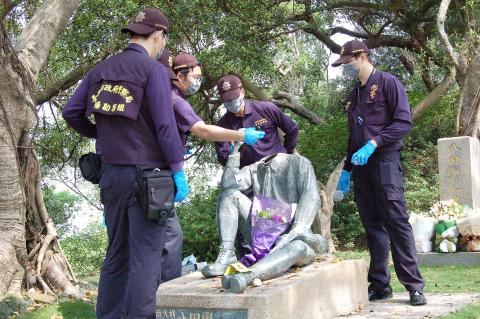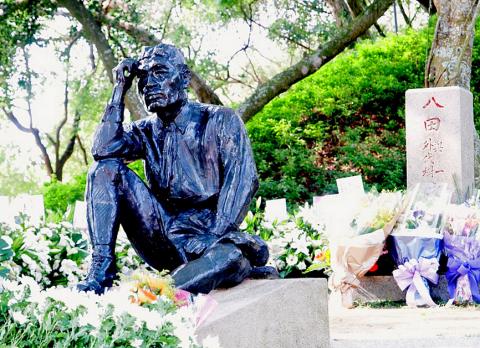A statue of Japanese engineer Yoichi Hatta near Tainan’s Wushantou Reservoir (烏山頭水庫) was found decapitated in an apparent act of vandalism, the Taiwan Chia-Nan Irrigation Association said yesterday.
Hatta is dubbed the “father of the Chianan Irrigation System” for his contributions to the development of irrigation in the Chianan Plain (嘉南平原) in southern Taiwan by building the Wushantou Reservoir during the Japanese colonial era.
An association member exercising in the area at about 6am saw that the statue’s head was missing, association president Yang Ming-feng (楊明風) said, adding that he told workers at the reservoir to call the police.

Photo: Wang Han-ping, Taipei Times
Police arriving at the scene surveyed the damage and collected information.
“The culprits of this violent act against Hatta’s memory should be strongly condemned,” Yang said.
The Tainan City Government issued a statement condemning the decapitation, saying that Tainan Mayor William Lai (賴清德) has instructed the city’s police department to form a task force to find the culprits.

Photo: Tsai Wen-chu, Taipei Times
A civil engineering graduate from then-Tokyo Imperial University (now the University of Tokyo), Hatta arrived in Taiwan in 1909 to serve at the civil engineering bureau, controlled by the Taiwan governor-general’s office.
In 1919, Hatta was tasked with designing an irrigation network for the Chianan Plain.
Following about 10 years of construction, Hatta’s team completed the reservoir in May 1930.
The reservoir has a capacity of 150 million cubic meters and can irrigate 100,000 hectares of farmland through a network of canals with a total length of 16,000km running through Chiayi and Tainan.
Hatta was killed in 1942, onboard a Japanese ship that was sunk in a submarine attack during World War II. He was on his way to Manila, where the Japanese government had sent him to develop agriculture in the Philippines.
His body was found, and after cremation, a portion of his ashes was taken to Taiwan for burial in a gravesite at the reservoir.
Following Hatta’s death, his wife, Toyoki Yonemura, remained in Taiwan. Heartbroken over the sudden and tragic loss of her husband, she committed suicide on Sept. 1, 1945, by jumping into the reservoir her husband had built.
The statue of Hatta was commissioned by the engineer’s aides and created by Japanese sculptor Yuma Tsukada of Kanazawa; it was shipped to Taiwan in 1931. However, local residents hid the statue for 40 years from 1941, fearing the Japanese government and later the Chinese Nationalist Party (KMT) government would want to melt down the statue for war materials and for political reasons.
Only when the political climate began to change in 1981 did the residents uncover the statue. It was reinstalled at the reservoir park.
On the anniversary of Hatta’s death on May 8 each year, the Chia-Nan Irrigation Association holds a memorial to honor his contribution in turning the Chianan Plain into Taiwan’s rice bowl.
Lai has asked the irrigation association to enlist professional help to repair the statue ahead of the event, the city government said.
Replacing the statue’s head should not be a problem, as the irrigation association had made a mold of the statue as a precaution, sources said.
News of the statue’s decapitation led to an outcry and speculation among local residents, with some accusing supporters of unification with China or people with anti-Japanese sentiments.
Some residents said Hatta’s legacy is apolitical and should not be used to incite hatred.
Former commissioner of then-Tainan county Su Huan-chih (蘇煥智) in a Facebook post called the decapitation “a deliberate act” adding that he believes the culprits targeted the statute to sabotage next month’s memorial service.
He said that people who vandalized the statues of Chiang Kai-shek (蔣介石) in “vigilante-like actions” have incited populist hatred and partisan acrimony in Taiwan, adding that all such actions should be condemned.

The inspection equipment and data transmission system for new robotic dogs that Taipei is planning to use for sidewalk patrols were developed by a Taiwanese company, the city’s New Construction Office said today, dismissing concerns that the China-made robots could pose a security risk. The city is bringing in smart robotic dogs to help with sidewalk inspections, Taipei Deputy Mayor Lee Ssu-chuan (李四川) said on Facebook. Equipped with a panoramic surveillance system, the robots would be able to automatically flag problems and easily navigate narrow sidewalks, making inspections faster and more accurate, Lee said. By collecting more accurate data, they would help Taipei

STATS: Taiwan’s average life expectancy of 80.77 years was lower than that of Japan, Singapore and South Korea, but higher than in China, Malaysia and Indonesia Taiwan’s average life expectancy last year increased to 80.77 years, but was still not back to its pre-COVID-19 pandemic peak of 81.32 years in 2020, the Ministry of the Interior said yesterday. The average life expectancy last year increased the 0.54 years from 2023, the ministry said in a statement. For men and women, the average life expectancy last year was 77.42 years and 84.30 years respectively, up 0.48 years and 0.56 years from the previous year. Taiwan’s average life expectancy peaked at 81.32 years in 2020, as the nation was relatively unaffected by the pandemic that year. The metric

TAKING STOCK: The USMC is rebuilding a once-abandoned airfield in Palau to support large-scale ground operations as China’s missile range grows, Naval News reported The US Marine Corps (USMC) is considering new sites for stockpiling equipment in the West Pacific to harden military supply chains and enhance mobility across the Indo-Pacific region, US-based Naval News reported on Saturday. The proposed sites in Palau — one of Taiwan’s diplomatic allies — and Australia would enable a “rapid standup of stored equipment within a year” of the program’s approval, the report said, citing documents published by the USMC last month. In Palau, the service is rebuilding a formerly abandoned World War II-era airfield and establishing ancillary structures to support large-scale ground operations “as China’s missile range and magazine

A 72-year-old man in Kaohsiung was sentenced to 40 days in jail after he was found having sex with a 67-year-old woman under a slide in a public park on Sunday afternoon. At 3pm on Sunday, a mother surnamed Liang (梁) was with her child at a neighborhood park when they found the man, surnamed Tsai (蔡), and woman, surnamed Huang (黃), underneath the slide. Liang took her child away from the scene, took photographs of the two and called the police, who arrived and arrested the couple. During questioning, Tsai told police that he had met Huang that day and offered to